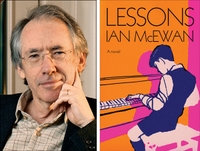Machines Like Me
Ian McEwan. Doubleday/Talese, $26.95 (352p) ISBN 978-0-385-54511-2
McEwan’s thought-provoking novel (after Nutshell) is about the increasingly fraught relationship between a man, a woman, and a synthetic human. Opening in an alternate 1982 London in which technology is not dissimilar from today’s (characters text and send emails), 32-year-old Charlie spends £86,000 of his inheritance on the “first truly viable manufactured human with plausible intelligence and looks,” who can pass for human unless closely inspected. His name is Adam (there are 12 Adams and 13 Eves total; the Eves sell out first), and Charlie designs Adam’s personality along with his neighbor and girlfriend Miranda. Soon, Adam informs Charlie that he “should be careful of trusting her completely,” and quickly falls in love with her, thus inextricably binding their fates together. The novel’s highlight is Adam, a consistently surprising character who quickly disables his own kill switch and composes an endless stream of haiku dedicated to Miranda because, as he states, “the lapidary haiku, the still, clear perception and celebration of things as they are, will be the only necessary form” as misunderstanding is eradicated in the future. The novel loses steam when Adam’s not the focus: much page space is devoted to a thread about an orphan boy, as well as Charlie’s thoughts and feelings about Miranda. Though the reader may wish for a tighter story, this is nonetheless an intriguing novel about humans, machines, and what constitutes a self. [em](Apr.)
[/em]
Details
Reviewed on: 01/30/2019
Genre: Fiction
Compact Disc - 978-1-9800-3443-8
Hardcover - 352 pages - 978-0-7352-7819-6
Other - 978-0-385-54512-9
Paperback - 352 pages - 978-0-525-56703-5
Paperback - 400 pages - 978-0-593-15281-2
Paperback - 320 pages - 978-1-5291-1126-2
Paperback - 978-1-78614-225-2
Paperback - 352 pages - 978-0-7352-7821-9
Paperback - 448 pages - 978-1-5291-1125-5


